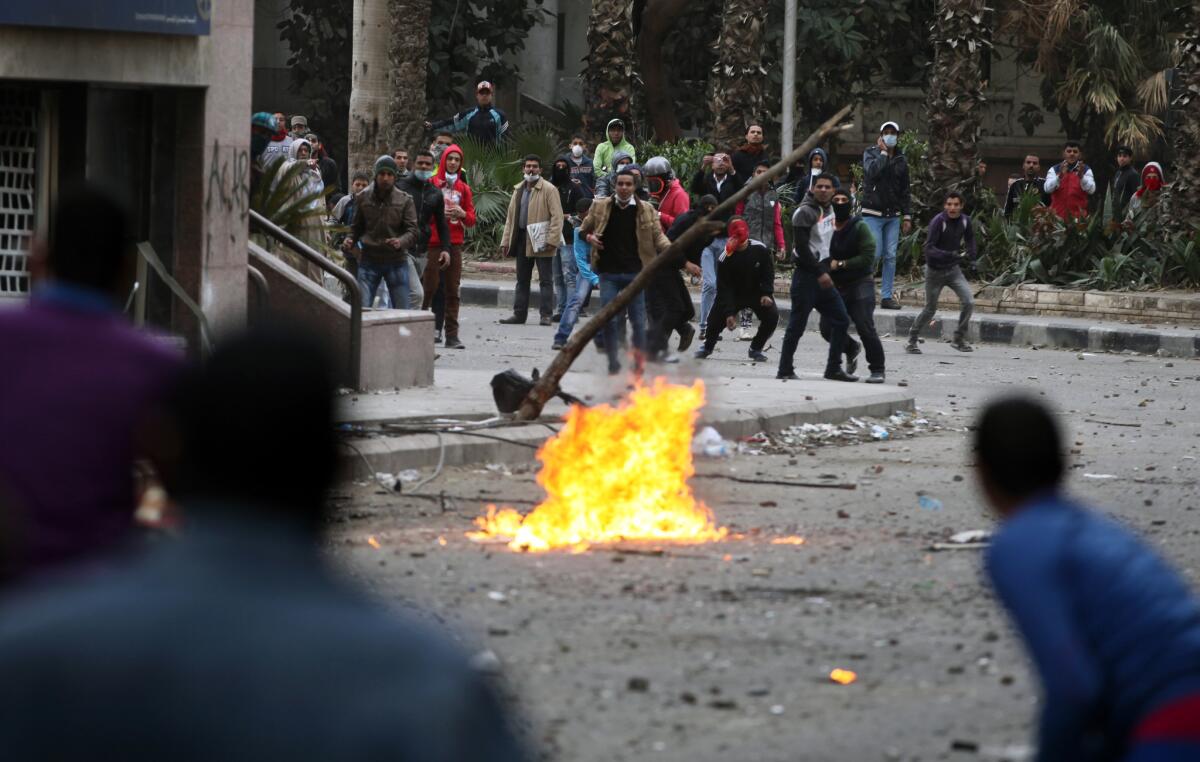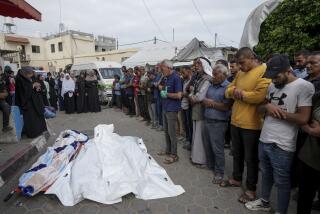Egyptian opposition leader calls for talks to end violence

CAIRO -- A key Egyptian opposition leader Wednesday called for talks with President Mohamed Morsi, ultraconservative Islamists and military officials to quell days of rioting that have killed more than 50 people and left the country edging toward anarchy.
The proposal by Nobel Peace Prize laureate Mohamed ElBaradei, a leader in the National Salvation Front, came as two men were killed near Tahrir Square and nationwide protests echoed for a sixth day. The sense of urgency is high but disparate political factions have rarely succeeded in putting aside differences.
“We need an immediate meeting between the president, defense and interior ministers, the ruling party, the Salafis and the National Salvation Front to take urgent steps to halt the violence and start serious dialogue,” ElBaradei, who this week had rejected talks with Morsi, wrote on his Twitter account.
The move comes a day after Egypt’s military commander warned Morsi and his political enemies to reach a compromise before the economy collapses. The nation is in danger of unraveling in a rebellion that has made clear the police have lost control and the Islamist-led government lacks the respect to even enforce a curfew in restive cities along the Suez Canal.
It is uncertain if the opposition can play a major role in stemming the chaos.
The National Salvation Front is divided, scattered and lacks credibility among poorer and working-class protesters. But ElBaradei’s call for talks would gather key players to resolve unrest that has damaged Egypt’s international standing at a time it needs billions of dollars in foreign investment.
The opposition had earlier balked at Morsi’s offer for national dialogue, blaming him for the bloodshed. But pressure has grown to find a solution. The ordeal has so altered the political landscape that the mainly secular opposition is siding with the ultraconservative Islamist Salafis in a bid to force Morsi and his more moderate Muslim Brotherhood into a unity government.
That unlikely alliance highlights the widening fissures among Islamist parties and further indicates that Morsi and the Brotherhood have badly miscalculated the nation’s political dynamics since the movement’s rise to power following the overthrow two years ago of Hosni Mubarak.
The Brotherhood’s fervor to cement its authority, including its authoritarian tactics and the pushing-through of a much-criticized constitution, has exposed its inability to calm the furor against Morsi.
The president invoked emergency powers Sunday and ordered curfews in the coastal cities of Port Said, Suez and Ismailia. The towns, whose ports are vital to the Suez Canal and the nation’s economy, have experienced the worst violence. Residents flaunted the curfew by protesting, getting married, playing soccer and congregating in cafes while the army chose not to intervene.
Placards rose mocking the president: “There is no state of emergency in the canal cities, Morsi.” He has since allowed the provincial governors to scale back the curfew; Ismailia has cut it to three hours, from 2 a.m. to 5 a.m.
Meanwhile, Morsi traveled to Berlin on Wednesday in an effort to expand trade between Egypt and Germany. He rushed home hours later. The U.S. and Europe are alarmed at Egypt’s political crisis and its deep financial problems. Foreign reserves have fallen by half and public debt mounts.
German Chancellor Angela Merkel told Morsi at a news conference that Egypt must allow “different political forces [to] make their contribution, that human rights are adhered to ... and that, of course, religious freedom can be experienced.”
Renewed calls for a unity government -- an idea opposed by Morsi -- would lift the opposition’s stature ahead of parliamentary elected expected this spring. Amr Moussa, a former foreign minister and member of the National Salvation Front, called for a “comprehensive political truce.”
But the opposition has often been blamed for missing opportune chances.
“The National Salvation Front completely failed to galvanize the people against the Brotherhood. You cannot legitimately call for the removal of the president when he was elected,” said Hafsa Halawa, a liberal lawyer and protester. “There should be a way to improvise, a way to allow the president and the opposition to find middle ground.”
The opposition is keen to prevent the army from again taking control of the country. The warning Tuesday by Gen. Abdel Fattah Sisi, the defense minister, suggested that the army is losing patience with Morsi and political factions. Sisi has not signaled that the military will step in, but some suggested his comments were a veiled threat.
The army ruled the country from Mubark’s downfall in February 2011 until Morsi was elected last June. It was condemned by human rights groups for indiscriminate arrests, brutality and stifling political expression.
The army pulled back from the political scene when Morsi purged its leadership in August. It has been adamant, however, that it will not allow Egypt’s chaos to further jeopardize the economy.
ALSO:
South Korea launches satellite into orbit
Israel promises to release some Palestinian tax funds
Pakistani teen activist to have reconstructive cranial surgery
Special correspondent Reem Abdellatif contributed to this report.
More to Read
Sign up for Essential California
The most important California stories and recommendations in your inbox every morning.
You may occasionally receive promotional content from the Los Angeles Times.











